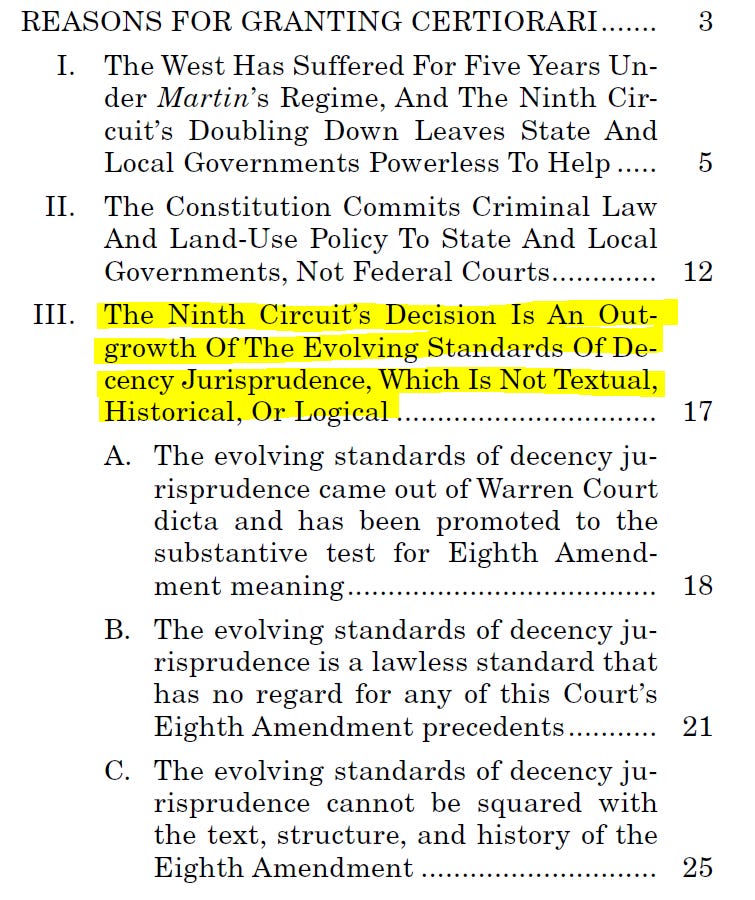Florida AG joins others urging SCOTUS to eliminate "evolving standards of decency"
In a case out of the Ninth Circuit, Florida AG Ashley Moody joined several others as amici urging the Court to reject the "evolving standards of decency" standard under Eighth Amendment jurisprudence.
Yesterday, the Sun Sentinel Editorial Board published an Opinion discussing Justice Francis’s opinion denying Michael Zack’s claims ahead of his execution scheduled October 3. (More on that decision here.)
A focus of the Opinion was the Court’s skepticism of the “evolving standards of decency” standard, which is the controlling standard under U.S. Supreme Court precedent for reviewing Eighth Amendment claims. The Opinion contends that there is support under this standard to abolish capital punishment:
A fair interpretation of evolving standards of decency would outlaw the death penalty under most, if not all, cases. Its supporters have long since ceased pretending that it is a deterrent. Only 27 states, most in the South and West, the federal government and the military still allow it. Seven states have repealed it since 2009, most recently Virginia, after carrying out the second most executions since 1973.
U.S. Supreme Court justices cited “evolving standards” 16 times in a combination of 1972 opinions that briefly abolished the death penalty nationwide, and again in subsequent cases prohibiting the death sentence for rape, for minors and for the intellectually disabled.
Courts like Florida’s have needed to invent a myriad of procedural technicalities, as in the Damren case, to continue upholding death sentences. The risk of executing an innocent person is high, as reflected in the fact that 192 present or former death row inmates have been exonerated since 1973. Florida leads all other states on that list with 30.
Another compelling reason is the refusal of some governors, notably DeSantis and every Florida governor since 1983, to exercise their clemency powers by commuting death sentences to life in prison. From 1925 through 1964, 10 governors spared 55 inmates while sending 195 others to their deaths. After executions resumed, Gov. Bob Graham commuted six, but all except one of Florida’s 104 executions have occurred since then.
While the “evolving standards of decency” framework remains on the books, it is certainly in conservatives’ crosshairs. In City of Grants Pass v. Johnson, the City of Grants Pass filed a petition for writ of certiorari asking the U.S. Supreme Court to review the U.S. Court of Appeals for the Ninth Circuit’s judgment related to public camping restrictions. The petition presents the following question:
Where’s the connection to Florida?
Florida Attorney General Ashley Moody joined an amicus brief filed in City of Grants Pass v. Johnson, in which the amici urge the Court to reject the “evolving standards of decency” standard.
Here are the arguments presented in the amicus brief:
The brief makes clear amici’s desire to have the Court reject the “evolving standards of decency” standard altogether:
The Court’s Eighth Amendment jurisprudence is a problematic outlier, and its forward march “has no discernible end point.” Miller v. Alabama, 567 U.S. 460, 501 (2012) (Roberts, C.J., dissenting). It has caused much mischief already and will continue to do so until corrected. Glossip v. Gross, 576 U.S. 863, 899 (2015) (Scalia, J., concurring). Courts should not be tasked with judging the changing winds of society’s evolving morals. Their job is to declare what the law says—not what they think society would like it to say. This case confirms the need for this Court to ground the Eighth Amendment’s meaning in text, structure, and history. Doing so will protect the sovereign role states have over the health, safety, and welfare of their communities. And it will bring harmony to the Court’s constitutional interpretive framework. See Bucklew v. Precythe, 139 S. Ct. 1112, 1122 (2019).
The full brief can be downloaded here.
The U.S. Supreme Court has not yet ruled on the petition.







Anything to eliminate the death penalty?
In any age, it is the appropriate and deserved punishment for some crimes committed by some people. Deterrence is irrelevant.
Isn't "evolving standards of decency" a quote from Furman? How can they claim it's "not textual?"